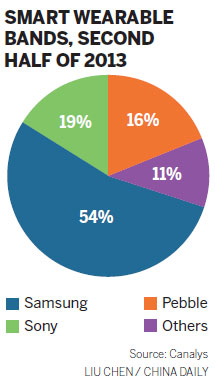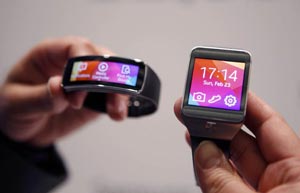Brand challenge of smart and wearable bands
By Shen Jingting (China Daily) Updated: 2014-02-25 07:29Zeng Xuezhong, ZTE's executive vice-president, pointed out that the wearable gadgets market is a "blue sea", since no company currently dominates this new field and every player has an equal opportunity.
Global smart-watch shipments reached a record 1.9 million units in 2013, according to Strategy Analytics, a US-based research company. Matt Wilkins, the company's director, said, "We estimate that less than 1 percent of all smartphones shipped worldwide were bundled with smart watches in 2013, so there remains huge scope for smart-watch growth."
 "It is very early days, of course, but the smart-watch market is starting to take shape," Wilkins said in a research note.
"It is very early days, of course, but the smart-watch market is starting to take shape," Wilkins said in a research note.
South Korea-based Samsung Electronics Co Ltd, of course, poses the most obstacles for Chinese players hoping to gain a major share in the smart wearable market.
Samsung accounted for more than half of the world's smart band shipments in the second half of 2013, according to research firm Canalys.
In the same period, Sony was the No 2 smart-band vendor, with a 19 percent global share.
"Samsung launched Galaxy Gear with a major marketing push that received significant consumer interest," said Chris Jones, principal analyst at Canalys. "Shipments of the device took Samsung to the top of the smart-band category, although disappointing sell-through will necessitate more promotional activity in coming months."
Canalys estimated this will be the year that wearables become a key consumer technology. The smart-band segment is expected to reach 8 million annual units shipped.
Daniel Matt, another Canalys analyst, said he expects the high-margin smart bands that incorporate sophisticated sensor technology will offer vendors great profit potential.
"With increased awareness about personal well-being, having a computer on your wrist will become increasingly common," Matt said in an email to China Daily.
Huawei's Yu predicted that smart-band gadgets likely will utilize cloud technology and that more and more smartphones will be tied to specific wearable products in the near future.
|
 |
Xiaomi to launch online sale of high-end Mi3 phone in Taiwan |
- NHTSA says finds no 'defect trend' in Tesla Model S sedans
- WTO rare earth ruling is unfair
- Amway says 2014 China sales may grow 8%
- President Xi in Europe: Forging deals, boosting business
- CNOOC releases 2013 sustainability report
- Local production by Chery Jaguar Land Rover this year
- Car lovers test their need for speed in BMW Mission 3
- China stocks close mixed Monday


















